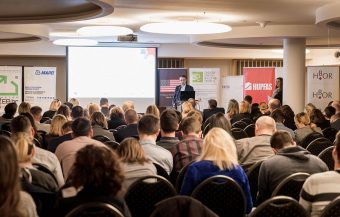
At a time when the world is facing increasingly pronounced challenges caused by climate change, sustainable green construction is a key component of their solution. This is not only about buildings that look modern and, at first glance, exist in harmony with nature but about buildings which, at their core, reflect a much deeper understanding of ecology, energy, and responsible construction.
The Croatian Green Building Council (GBC) is the largest non-governmental and membership organization in Croatia. It deals with sustainable construction, energy efficiency and green energy. It is also engaged in the business network of the companies and organizations that are green transition leaders. The GBC has over 130 members from construction, energy, public administration and the academic community, and its main goal is to help its members and other relevant market players act in the direction of a sustainable, urban way of life. The GBC achieves this goal through education, networking and promotion.
According to certain recently published estimates, buildings in the European Union (EU) produce approximately 40 per cent of emissions. They are huge energy consumers responsible for 35 per cent of construction material consumption and 35 per cent of waste generation in the same sector. That’s why buildings have the greatest potential for savings and are a key point in the EU’s interest in becoming climate-neutral by 2050.
Given that the Croatian Green Building Council is one of the important organizations in promoting sustainable practices in the region, we got more specific insights into this issue in our conversation with the Council. We spoke with its Executive Director, Dean Smolar, about the challenges and solutions, as well as the Council’s future initiatives.
IN FOCUS:
- CIRCULAR ECONOMY – THINK LOCALLY, ACT GLOBALLY
- LUXEN SOLAR – A RELIABLE PARTNER FOR THE SOLAR FUTURE
- OVERVIEW OF THE SITUATION IN SERBIA REGARDING THE TRANSITION TO A CIRCULAR ECONOMY
A part of a wider network
With 76 countries worldwide and over 36,000 members, the World Green Building Council (WGBC) is the largest and most influential global network aiming to promote a sustainable and decarbonized environment for all. The Croatian Green Building Council is part of this network, as well as the European Regional Network of Green Building Councils (ERN). Through global connectivity, common goals are accomplished through various local, regional and world projects. The Croatian Green Building Council actively participates in projects financed from national and European sources, where, as partners, they have the opportunity to demonstrate their capabilities.

The Croatian Green Building Council acts as a platform for promoting the positive impact of sustainable construction and everything that goes with it. It rests on four organizational pillars – membership, events, projects, and certification.
“In addition to membership, GBC successfully organizes various educational events and conferences, workshops, and symposiums, which more than 10,000 participants have attended. Everything functions as a single platform for primarily national networking of policymakers and industry leaders and their exchange of ideas. Thus, in the last few years, GBC has been engaged in these segments as a key partner in numerous projects”, says Mr Smolar.
For the past year, they have been working a lot on developing the DGNB green building certificate, which is an abbreviation for the German Sustainable Building Council (Deutschen Gesellschaft für Nachhaltiges Bauen) and its version adapted to the Croatian market. They also organize training sessions about this certificate for future consultants as an official Academy Partner.
The DGNB certification system is the only one completely aligned with EU regulations and norms, so it does not require harmonization of documentation for the European market. The GBC is the DGNB’s partner in Croatia, i.e. the only organization in the country through which a project can be registered for certification. The DGNB brings not only a certification system but a vision of transformation of the construction industry. Founded in 2007 as an independent non-profit organization, it quickly gained a reputation as one of the most advanced international sustainable construction standards, with over 10,000 certified projects in nearly 30 countries.
Prepared by: Milica Vučković
Read the story in the new issue of the Energy portal Magazine CIRCULAR ECONOMY



